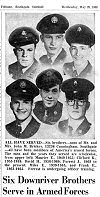Native Americans in Military Service - pg 2Strength To be an American Indian warrior is to have physical, mental, and spiritual strength. A warrior must be prepared to overpower the enemy and face death head-on. American Indian soldiers, sailors, marines, and airmen have fought heroically in all of this century's wars and armed conflicts. They have not only been formally recognized for their bravery through military decoration but through anecdotal observation as well. More important, however, is the warrior's spiritual strength. Many traditional cultures recognize that war disrupts the natural order of life and causes a spiritual disharmony. To survive the chaos of war is to gain a more intimate knowledge of life. Therefore, military service is a unique way to develop an inner strength that is valued in Native American society. Having a strong sense of inner spirituality is also a part of the Indian character. Many Native Americans are raised on rural or remote reservations, an environment that fosters self- reliance, introspection, and a meditative way of thinking. These character traits can be very beneficial when adapting to the occasional isolation of military life in times of both peace and war. Honor, Pride, Devotion Warriors are honored - honored by their family and their tribe. Before going into service and upon their return, warriors are recognized by family and community. Recognition takes place through private family gatherings, or through such public ceremonies as tribal dances or intertribal ceremonies. My people honored me as a warrior. We had a feast and my parents and grandparents thanked everyone who prayed for my safe return. We had a "special" [dance] and I remembered as we circled the drum, I got a feeling of pride. I felt good inside because that's the way the Kiowa people tell you that you've done well. — Kiowa Vietnam Veteran Being a warrior in traditional American Indian society gives one a sense of pride and a sense of accomplishment at a time in life when self-esteem is just developing. Becoming a warrior brings status to young men and women in their culture. The ceremonies that honor the warrior create a special place in the tribe's spiritual world. After I got home, my uncles sat me down and had me tell them what it [the war] was all about. One of them had been in the service in World War II and knew what war was like. We talked about what went on over there, about killing and the waste, and one of my uncles said that God's laws are against war. They never talked about those kinds of things with me before. — Cherokee Vietnam Veteran United States military service provides an outlet for Native Americans to fulfill a cultural purpose rooted in tradition — to fight and defend their homeland. This purpose is particularly important since it comes when young people of the tribe are normally not old enough to assume a leadership role in their traditional culture. The cultural expectation to be a warrior provides a purpose in life and is an important step in gaining status in Native America culture. When I went to Germany , I never thought about war honors, or the four "coups" which an old-time Crow warrior had to earn in battle....But afterwards, when I came back and went through this telling of war deeds ceremony... lo and behold I [had] completed the four requirements to become a chief. — Crow World War II Veteran Native American warriors are devoted to the survival of their people and their homeland. If necessary, warriors will lay down their lives for the preservation of their culture, for death to the American Indian warrior is but another step in the advancement of life. It is understood that the warrior's spirit lives on eternally. So, warriors do not fear death, but rather regard it as the ultimate sacrifice for their own and their people's continued survival. Wisdom The warrior seeks wisdom. Wisdom, as used in this context, means the sum total of formal learning and worldly experiences. In wartime, those Native Americans seeing heavy combat had to learn how to survive, often using skills that may unit commanders thought were inherent to the American Indian's cultural background. A Sac and Fox/Creek Korean veteran remarked: My platoon commander always sent me out on patrols. He. . . probably thought that I could track down the enemy. I don't know for sure, but I guess he figured that Indians were warriors and hunters by nature. Many American Indians (as well as non-Indian volunteers) joined the military in World War I to satisfy their sense of adventure. Most had never left the confines of their hometown, much less marched on the battlefields of Europe . These experiences provided a wisdom through exposure to other people and cultures. This was sometimes threatening to the elders of a tribe, who feared that this newfound worldliness would cause unwanted change to their culture. Over time, however, this wisdom of worldly events and peoples was accepted by tribal leaders. Today, Native Americans are increasingly exposed to the non- Indian world through movies and television. Although the military is still an avenue for seeing the world, it has, in the latter half of the 20th century, also provided other types of wisdom. Military service offers excellent educational and job skill opportunities for Native American me and women who frequently come from educationally disadvantaged communities. |
|
|||
